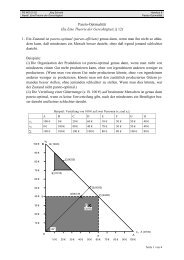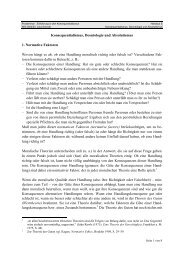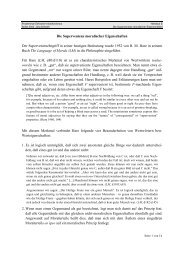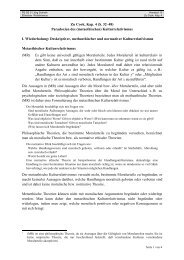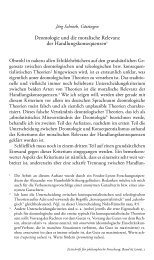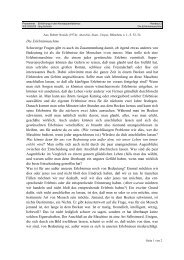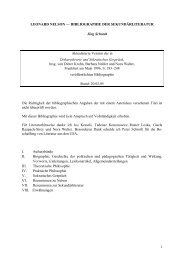Adäquatheitskriterien für moralische Theorien - Jörg Schroth
Adäquatheitskriterien für moralische Theorien - Jörg Schroth
Adäquatheitskriterien für moralische Theorien - Jörg Schroth
You also want an ePaper? Increase the reach of your titles
YUMPU automatically turns print PDFs into web optimized ePapers that Google loves.
Proseminar Einführung in die normative Ethik Handout 3<br />
WS 2002/03 <strong>Jörg</strong> <strong>Schroth</strong> <strong>Adäquatheitskriterien</strong> <strong>moralische</strong>r <strong>Theorien</strong><br />
4. Simplicity. If atheorywith afew basic norms generates sufficient moral content, then<br />
that theoryis preferable to atheorywith more norms but no additional content. Atheory<br />
should have no more norms than are necessary, and no more than people can use<br />
without confusion. However, morality is complicated, and any comprehensive moral<br />
theory will be immensely complex. We can demand only as much simplicity in amoral<br />
theory as its subject matter permits.<br />
5. Explanatory Power. Atheory has explanatory power when it provides enough insight<br />
to help us understand the moral life: its purpose, its objective or subjective status, how<br />
rights are related to obligations, and the like.<br />
6. Justificatory Power. Atheory should also give us grounds for justified belief, not a<br />
reformulation of beliefs we already possess. For example, the distinction between acts<br />
and omissions underlies many critical beliefs in biomedical ethics, such as the belief that<br />
killing is impermissible and allowing to die permissible. But amoral theory would be<br />
impoverished if it only expressed this distinction without determining whether the<br />
distinction justifiably grounds those beliefs. Agood theory also should have the power<br />
to criticize defective beliefs, no matter how widely accepted those beliefs may be.<br />
7. Output Power. Atheory has output power when it produces judgments that were not<br />
in the original data base of particular and general considered judgments on which the<br />
theorywas constructed. If atheorydid no more than repeat the list of judgments thought<br />
to be sound prior to the construction of the theory, nothing would have been<br />
accomplished. For example, if the parts of a theory pertaining to obligations of<br />
beneficence do not yield new judgments about role obligations of care in medicine<br />
beyond those assumed in constructing the theory, this failure of output suggests that the<br />
theory is purely aclassification scheme. Atheory, then, must generate more than alist<br />
of the axioms present in pretheoretic belief.<br />
8. Practicability. Aproposed moral theory is unacceptable if its requirements are so<br />
demanding that they probably cannot be satisfied or could be satisfied by only afew<br />
extraordinary persons or communities. Amoral theory that presents utopian ideals,<br />
paltry expectations, or unfeasible recommendations fails the criterion of practicability.<br />
For example, if atheory proposed such high requirements for personal autonomy[...] or<br />
such lofty standards of social justice [...] that, realistically, no person could be<br />
autonomous and no society could be just, the proposed theory would be deeply<br />
defective.<br />
Other general criteria could be formulated, but the eight sketched above are the most<br />
important for our purposes. Atheory can receive ahigh score on the basis of one<br />
criterion and alow score on the basis of another. For example, early in this chapter<br />
utilitarianism is depicted as an internally coherent, simple, and comprehensive theory<br />
with exceptional output power, yet it is not coherent with some of our vital considered<br />
judgments, especially with certain judgments about justice, human rights, and the<br />
importance of personal projects. By contrast, Kantian theories are consistent with many<br />
of our considered judgments, but their clarity, simplicity, and output power are limited.<br />
Seite 3 von 4






